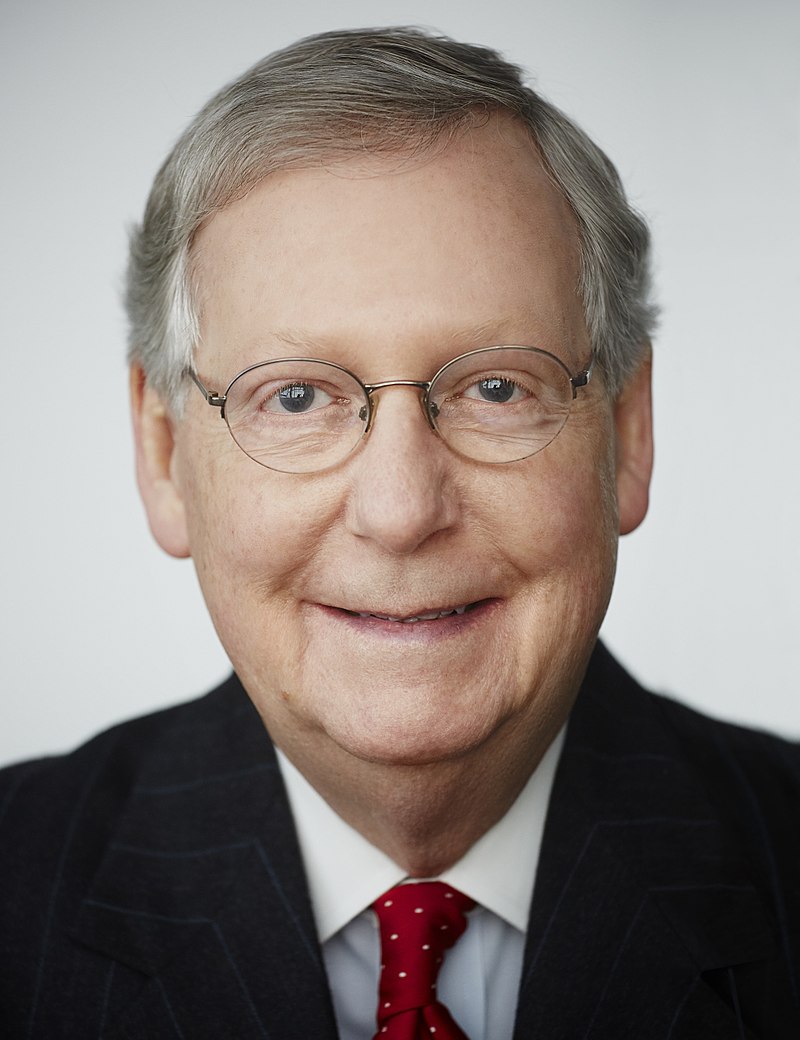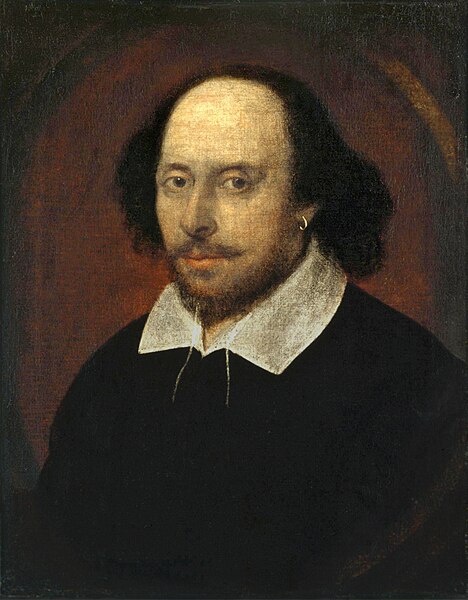Landschlacht, Switzerland, 20 October 2017
Captain Spock: Nature abhors a vacuum. I intend for you to replace me.
Lt. Valerus: I could never replace you. I could only succeed you.
(Star Trek VI: The Undiscovered Country)
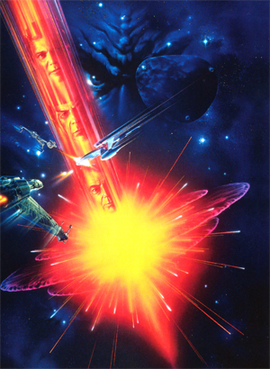
Above: Poster for Star Trek VI
It is a legitimate question.
When we are gone, who replaces us?
I know that in my role as an English teacher that I am expendable.
I can be replaced.
I know that in my role as a Starbucks barista that I am expendable.
I can be replaced.
I know that in my roles as brother, cousin, friend, uncle and husband that I am expendable.
I might not be so easily replaced, but after a period of mourning, and after the last mourner has also ceased to exist, I shall probably be forgotten in the ocean of time.
Even Presidents and Tsars are expendable.
It will be with the greatest difficulty that the present President of the United States will be impeached.
I am convinced that it is more a question of “when” rather than “if”.
For now, Republicans fear the future.
Donald Trump will probably be the first President who will lose his job as a result of impeachment, barred from running for any federal office again, and his name will be mud forevermore.

Above: Donald Trump. 45th US President since 20 January 2017
(If he doesn´t, like Richard Nixon, resign first…)

Above: Richard Nixon (1913-1994), 37th US President (1969-1974)
This has never happened before, though there were a couple of near misses.
If Trump is impeached and, unlike Andrew Johnson and Bill Clinton, is not acquitted by the Senate, then he will be replaced by Vice President Mike Pence.

Above: Andrew Johnson (1808-1875), 17th US President (1865-1869)

Above: Bill Clinton, 42nd US President (1993 – 2001)
But there is a possibility that Pence as well, for what will bring Trump´s downfall, may also be removed from office if also convicted of treason or bribery.
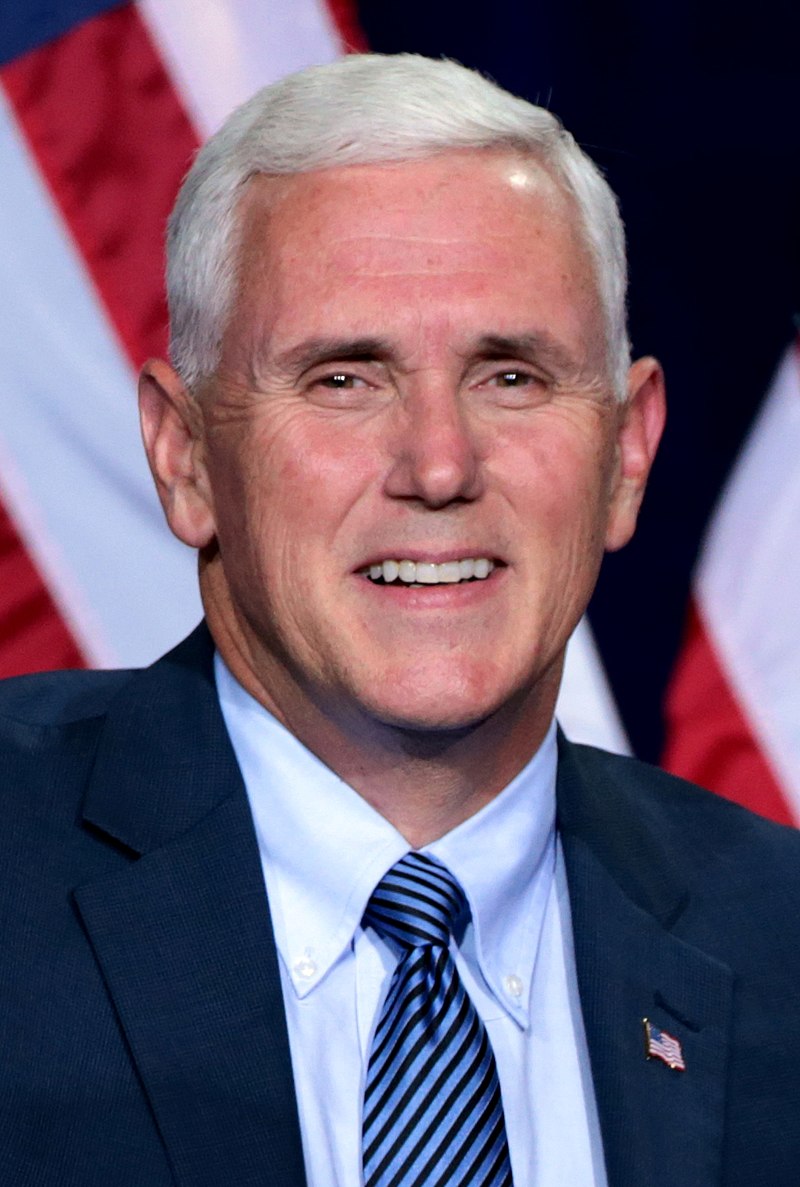
Above: Mike Pence, 48th US Vice President since 20 January 2017
Next in line for the Oval Office?
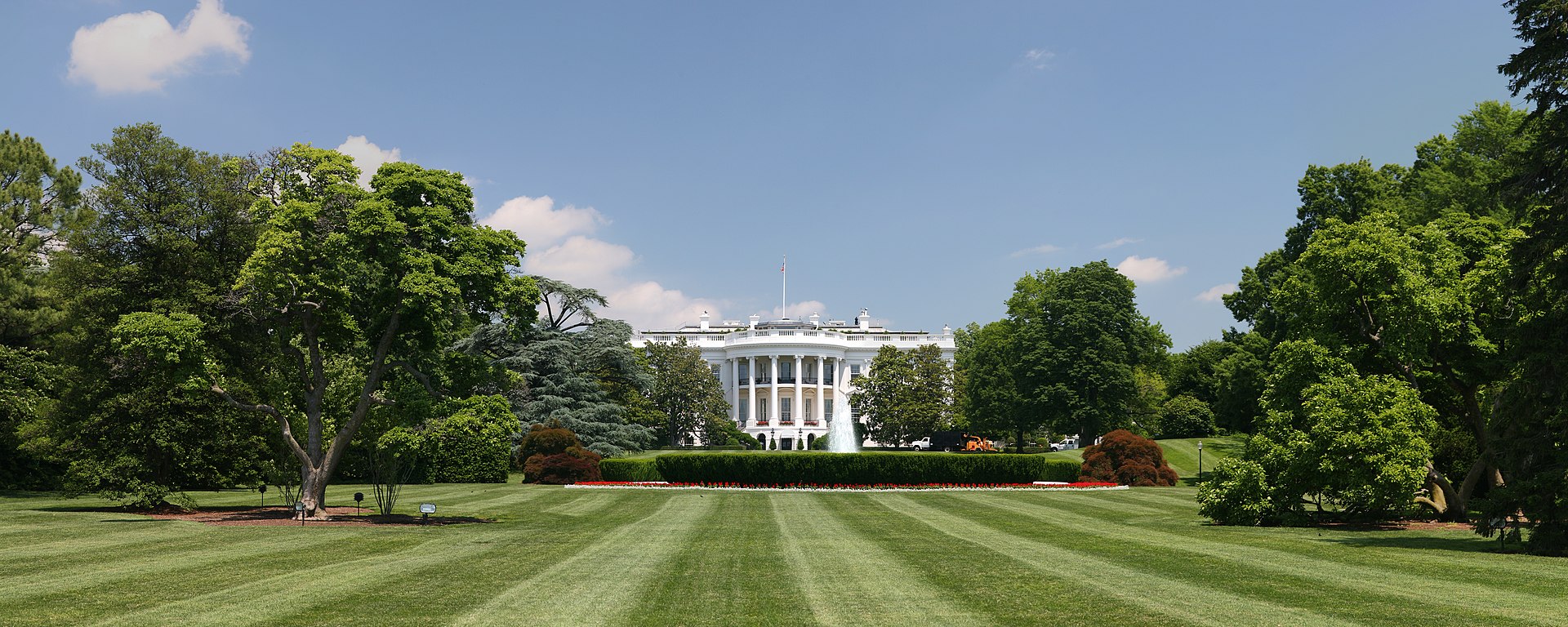
Above: The White House, Washington DC, USA
Senate Majority Leader Mitch McConnell.
Above: Mitch McConnell, Senate Majority Leader (2015-), Senator (1985-)
(I think.)
As there has never been a situation where both the President and the Vice President are simultaneously in danger of impeachment, we are truly in uncharted territory here.
Now imagine for a moment the situation that the President and his chosen successor have both been expelled from Washington, and for either reasons of equal culpability in Trump/Pence offences or (highly doubtful) McConnell chooses for some unknown reason not to assume the mantel of power….
What then?
Who then?
The Majority Whip?
The Leader of the House of Representatives?
The Chief Justice of the Supreme Court?
Who gets to be the Big Dog / the Big Cheese sitting at the Big Desk in the Oval Office?

Above: The Oval Office of the US President, The White House
Strange days.
But a strange similar situation developed in Russia a century ago that might be worth examining….
Mogilev, Russia, 28 February 1917
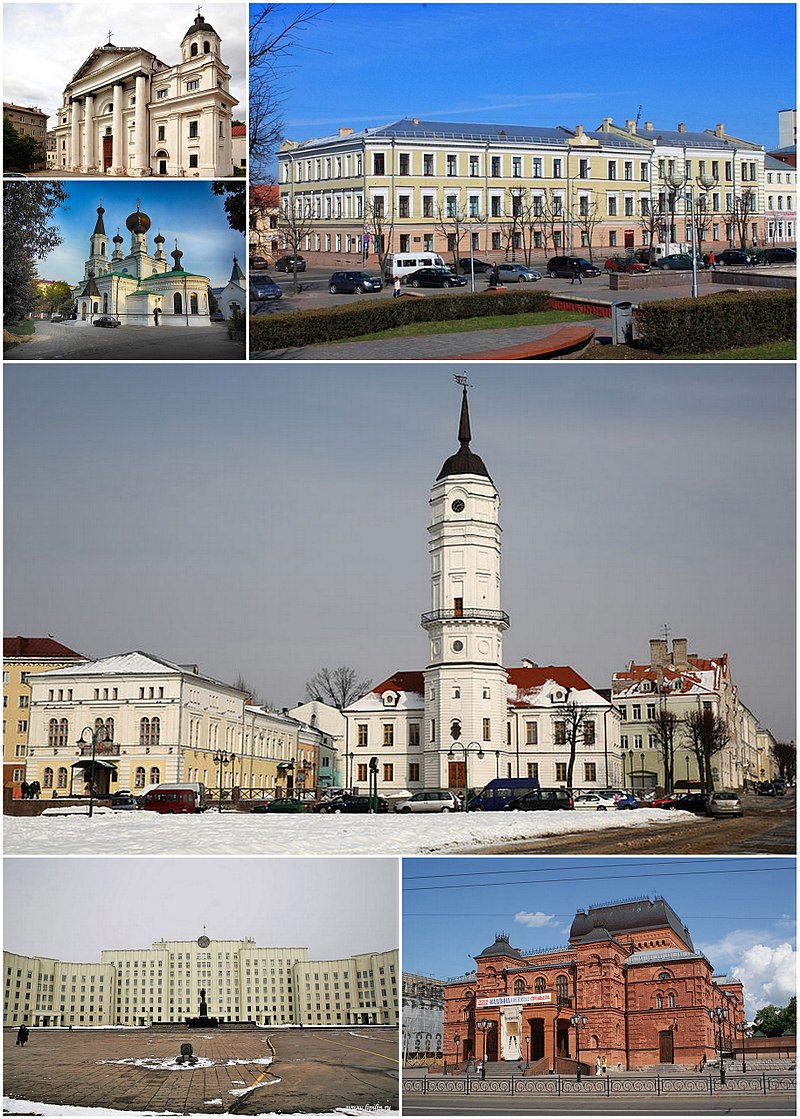
Above: Modern day Mogilev
At 5 am in the pre-dawn of Tuesday, the train carrying the Tsar Nicholas II back to Tsarskoe Selo left Mogilev, its windows darkened, its passengers asleep.
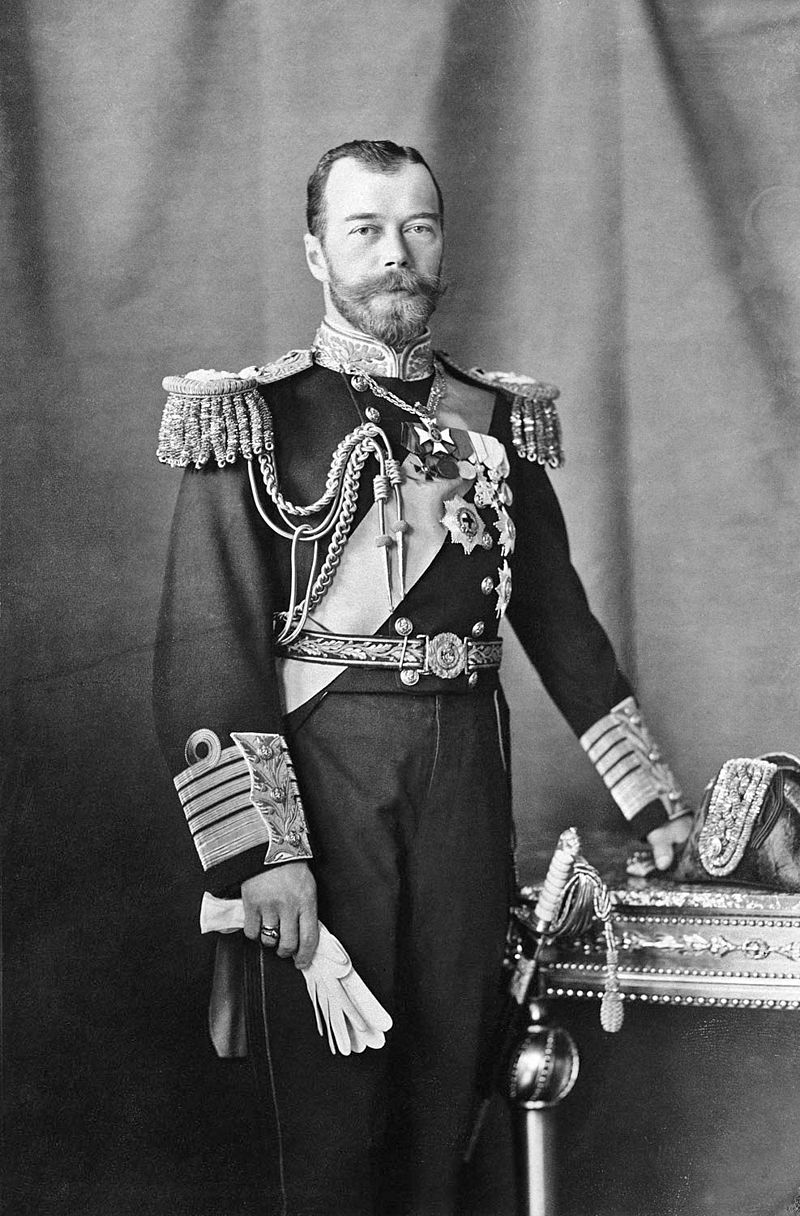
Above: Nicholas II of Russia (1868-1918), Tsar (1894-1917)
He expected to be home at 8 am on Wednesday.
“Every hour is precious, “ Michael had told his brother via telegraph on Monday night, urging him not to leave Mogilev at all so he could be in direct communication throughout the crisis.

Above: Grand Duke Michael Alexandrovich of Russia (1878-1918)
On his train, Nicholas was virtually incommunicado.
Russia no longer had a government and over the next crucial 27 hours it would, for all practical purposes, be without an emperor.
Nevertheless, when Nicholas reached Tsarskoe Selo the next morning he expected to hear that General Nikolai Ivanov and his 6,000 front line troops were in place to crush the Rebellion.
The Tsar could sleep easily.
Malaya Vishera, Russia, 1 March 1917
His train was on schedule and at 4 am Wednesday morning he was less than 100 miles from Tsarskoe Selo, having covered 540 miles since leaving Mogilev.
It was then the train abruptly stopped, at the town of Malaya Vishera, with the alarming news that the revolutionaries had blocked the line ahead.
Above: Malaya Vishera train station
Since the train had only a few guards aboard, fighting their way forward was out of the question.
There was only one choice for them….
To go back to Bologoe, halfway between Petrograd and Moscow, and then head west for Pskov, headquarters of General Nikolai Ruzsky´s Northern Army.
It was the nearest safe haven, though it would leave Nicholas 170 miles from home and worse off than if he had stayed in Mogilev where he could command the whole of his armies.
“To Pskov, then”, the Tsar said curtly and retired back to his sleeping car, but, once there he put his real feelings into his diary.
“Shame and dishonour”, Nicholas wrote despairly.
The journey to Pshov meant that for the next decisive 15 hours – until about 7 pm that Wednesday evening – the Emperor would once again vansih into the emply snow-covered countryside, a second day lost.
Pskov, Russia, 1 March 1917

Above: Modern day Pskov
As the Tsar had hoped, his train did eventually reach Pskov at around 7 pm that Wednesday evening, after travelling 860 miles in total but still almost 100 miles from his intended destination of Tsarsloe Selo.
At least he was back in contact with the world….one very different to that he knew of 38 hours earlier.
Not knowing what time his train was to be expected, there was no one at the Station to meet him, though shortly afterwards the army commander, General Nikolai Ruzsky, turned up, his manner unwelcoming.

Above: General Nikolai Ruzsky (1854 – 1918)
He did not bring good news.
What of those relief troops that Nicholas had sent to the capital?
The answer was that with no orders, no Tsar, and no one in authority, Ivanov had simply abandoned his task and turned back.
The capital was lost and would stay lost.
In the Tsar´s study aboard the train, Ruzsky believed that Nicholas now had no option but to grant the rebels´ concessions demanded of him and he said so, doggedly, over a gloomy dinner.
As stubborn as ever and still blind to his own peril, Nicholas refused to give up his autocratic powers.
Ruzsky was getting nowhere until a telegram arrived from General Alexeev at Mogilev, urging the same concessions.

Above: General Mikhail Alexeev (1857 – 1918)
Nicholas, now in an uncomfortable position, sought compromise.
Nicholas went to his sleeping car a rattled man.
In refusing the demands of politicians and dismissing the pleas of his brother and others, Nicholas had assumed the absolute loyalty of his senior military commanders.
Now they too seemed to be against him.
Pskov, Russia, 2 March 1917
At 2 am Nicholas called Ruzsky to his carriage and told him that he “had decided to compromise”.
A manifesto granting a responsible ministry, already signed, was on the table.
Ruzsky was authorised to notify Rodzyanko that he could now be prime minister of a parliamentary government.
But, at 3:30 am, Ruzsky got through to Petrograd on the direct line, Rodzyanko´s reply was shatteringly frank:
“It is obvious that neither His Majesty nor you realise what is going on here.
Unfortunately the manifesto has come too late.
There is no return to the past.
Demands for an abdication in favour of the son, with Michael Alexandrovich as Regent, are becoming quite definite.”
Ruzsky sent on Rodzyanko´s message to Alexeev at Supreme Headquarters.
At 9 am Alexeev cabled his reply:
“My deep conviction that there is no choice and that the abdication should now take place.
There is no other solution.”
Having made his own views clear, Alexeev sent out his own telegrams to his other army commanders and to the admirals commanding the fleets.
Russia had a war to fight and Alexeev was determined that the Revolution in Petrograd should not undermine the front line armies waiting to begin their spring offensive.
“The dynastic question has been put point blank.
The war may be continued until ist victorious end only provided the demands regarding the abdication from the throne in favour of the son and under the regency of Grand Duke Michael Alexandrovich are satisfied.
Apparently the situation does not permit another solution….”
His cables went out at 10:15 am.
At 2:15 pm he wired the Emperor at Pskov giving him the first three replies:
The commander on the Caucasus front could not be more frank:
“As a loyal subject I feel it my necessary duty of allegiance in the spirit of my oath, to beg your Imperial Majesty on my knees to save Russia and your heir and hand over to him your heritage.
There is no other way.”
Brusilov, the most successful fighting General in the army:
“The only solution is the abdication in favour of the heir Tsarevich under the Regency of Grand Duke Michael Alexandrovich.
There is no other way out.
Otherwise it will result in incalculable catastrophic consequences.”
General Alexei Evert, commander on the western front:
“Abdication is the only measure which apparently can stop the Revolution and thus save Russia from the horrors of anarchy.”
Nicholas rose and went to the window, staring out unseeingly.
He could not defy his Generals and they had just passed a vote of no confidence in him, both as Tsar and Supreme Commander.
He could not sack them nor could he argue with them.
Suddenly he turned and said calmly:
“I have decided.
I shall renounce the throne.”

Above: Tsar Nicholas II
Two short telegrams were drafted for Nicholas.
To Duma President Mikhail Rodzyanko:

Above: Mikhail Rodzyanko (1859 – 1924)
“There is no sacrifice which I would not bear for the sake of the real welfare and for the salvation of our on dear Mother Russia.
Therefore I am ready to abdicate the throne in favour of my son, provided that he can remain with me until he comes of age, with the Regency of my brother the Grand Duke Michael Alexandrovich.”

Above: Alexei Nikolaevich (1904 – 1918), his haemophilia (blood unable to clot, manifested in swollen limbs and frequent internal and external bleeding) would cause his mother to rely heavily on mystic/faith healer Rasputin
His second telegram to Alexeev was in similar terms.
At 3:45 pm Nicholas told Ruzsky to send them out.
At that moment, Nicholas ceased to be Tsar, Alexis was the new Emperor and Michael was Regent.
Or so it was assumed when an excited Rodzyanko spread the word in the Duma.
Indeed the abdication was so generally known that in London Nicholas´ cousin King George V wrote in his diary:
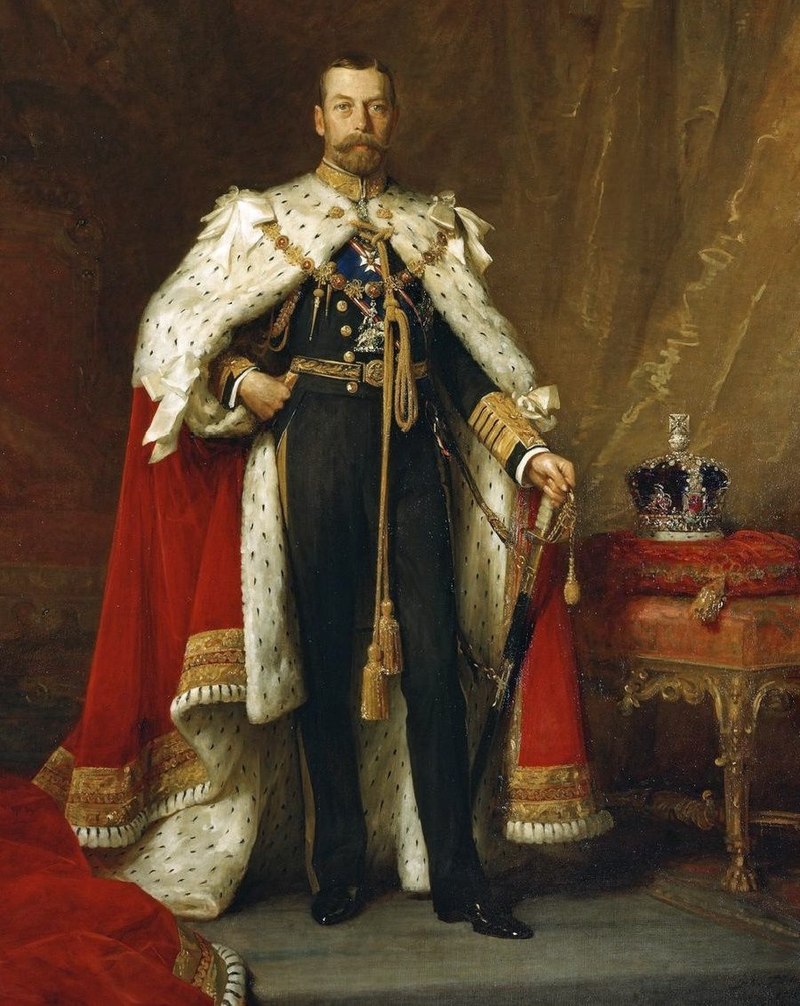
Above: George V of Britain (1865 – 1936), King (1910 – 1936)
“Heard from Buchanan (the British ambassadot) that the Duma had forced Nicky to sign his abdication and Misha had been appointed Regent.
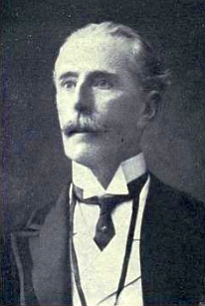
Above: British Ambassador to Russia George Buchanan (1854 – 1924)
I fear Alicky (the Empress) is the cause of it all and Nicky has been weak.”
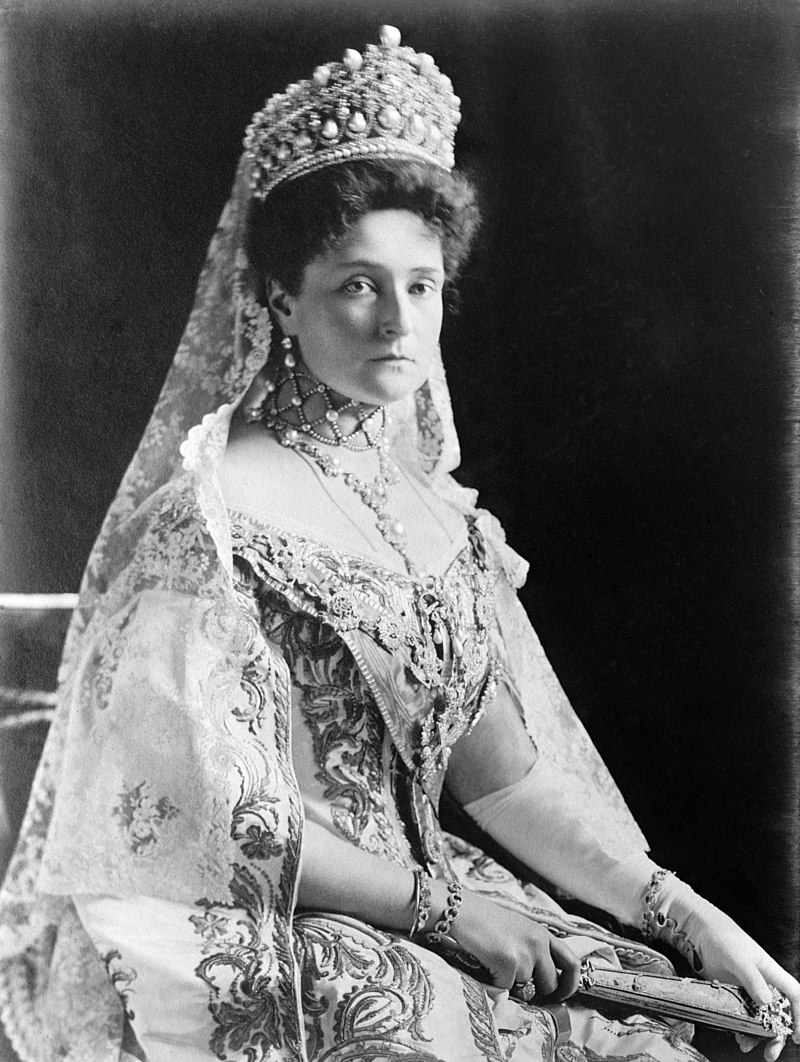
Above: Russian Tsarina Alexandra Feodorovna (1872 – 1918)
The relieved Duma began their negotiations with the Soviet over ending the Revolution and forming a responsible government.
10 pm: Alexander Guchkov, the architect of the earlier plot to arrest the Tsar and compel him to go and his co-monarchist Vasily Shulgin arrived in Pskov.
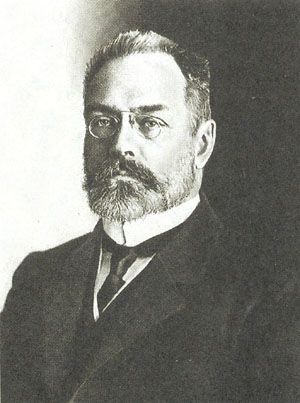
Above: Alexander Guchkov (1862 – 1936)

Above: Vasily Shulgin (1878 – 1976)
What no one knew was that Nicholas had changed his mind:
Yes, he would abdicate, but in so doing he would also remove his son from succession.
It would be his brother Michael not the boy Alexis who would be Emperor.
Petulance?
“If you won´t have me, then you won´t get my son.”
Behind this was a real worry that without the care of his family the fragile haemophilic Alexis could die, a possibility confirmed by Professor Sergei Fedorov, the court physician travelling with him.
Alexis was always at risk.
Guchkov, expecting a fierce row, was stunned to find that Nicholas had not only already abdicated but had drawn up a second abdication manifesto removing Alexis from the succession.
At a stroke it demolished a key aspect of the Duma´s argument – an innocent boy lawfully inherits the throne and a new responsible ministry is protected by Michael as Regent.
With that Nicholas took the manifesto into his study for amendment and signature.
“We have judged it right to abdicate the throne of the Russian state and to lay down the supreme power.
Not wishing to be parted from out beloved son, we hand over our succession to our brother Grand Duke Michael Alexandrovich and bless him on his accession to the throne of the Russian state.”
Pskov, Russia, 3 March 1917
Just after midnight, Nicholas left Pskov for Mogilev, the headquarters from which he had departed with such confidence just 44 hours earlier.
Throughout the formalities he had given no sign of distress but within himself he was anything but calm.
On the train he went to his diary and revealed his private agony:
“At one clock this morning I left Pskov with a heart that is heavy over what has just happened.
All around me there is nothing but treason, cowardice and deceit!”
As always with Nicholas, (and a century later with Trump), everyone was to blame but himself.
Petrograd, Russia, 3 March 1917
As news reached Tauride Palace in the early hours of Friday morning that Nicholas had removed both himself and his son from the throne, panic set in among the Duma leaders.

Above: Tauride Palace, St. Petersburg (formerly Petrograd)
The deal which they had thought settled with a reluctant Soviet had depended in great deal on persuading them that the new Tsar would be a harmless boy – not a tough battlefield commander with a high reputation in the army.
Among the throng of mutineers, fearful enough that Michael would be Regent, the immediate reaction was that, with Michael as Emperor, their necks were more at stake than ever.
Talk of a general amnesty would not save those who had killed their own officers.
Emperor Michael would have to be abandoned.
Nicholas had done for the Soviet what the Soviet did not dare to do on its own.
To save itself the new government would have to persuade Michael to give up the throne.
Although the new ministers hoped to meet Michael even before he knew he had Emperor, thousandsof troops in front line units were cheering his name and swearing an oath of allegiance to Emperor Michael II.
In Petrograd, Nicholas´ portraits had disappeared from shop windows and walls and in their place pictures of Michael Alexandrovich.
Faces were hung out and everyone wore smiles of quiet satisfaction.
The apartment´s 1st floor drawing room at 12 Millionnaya Street had been prepared to provide an informal setting.
Chairs were arranged so that Michael, when he took the meeting, would be facing a semicircle of delegates.
At 9:35 am, the drawing room door opened, ministers and deputies rose to their feet, and in walked the man being hailed across the country as His Majesty Emperor Michael II.
Michael sat down in his tall-backed chair, looked around the men facing him and the meeting began.
For Michael the first reality was to find everyone addressed him not as “Your Imperial Majesty” but as “Your Highness” – not as Emperor, but as Grand Duke.
It was intended as intimidation and the delegates thought it would speed up the process.
Michael, looking around the room, could see that the Duma men were exhausted, unshaven, bedraggled and unable even to think straight any more.
Many were also clearly frightened.
Duma President Rodzyanko also used fear as the excuse for abdication:
“It was quite clear to us that the Grand Duke would have reigned only a few hours, and that this would have led to colossal bloodshed in the precincts of the capital, which would have degenerated into civil war.
It was clear to us that the Grand Duke would have been killed immediately.”
During all the shouting and arguing, Michael sprawled in his chair, saying nothing.
He seemed embarrassed by what was going on and grew weary and impatient.
He had heard quite enough and saw no point in hearing more.
He rose and announced that he would consider the whole matter privately with Premier Georgiy Lvov and President Rodzyanko.
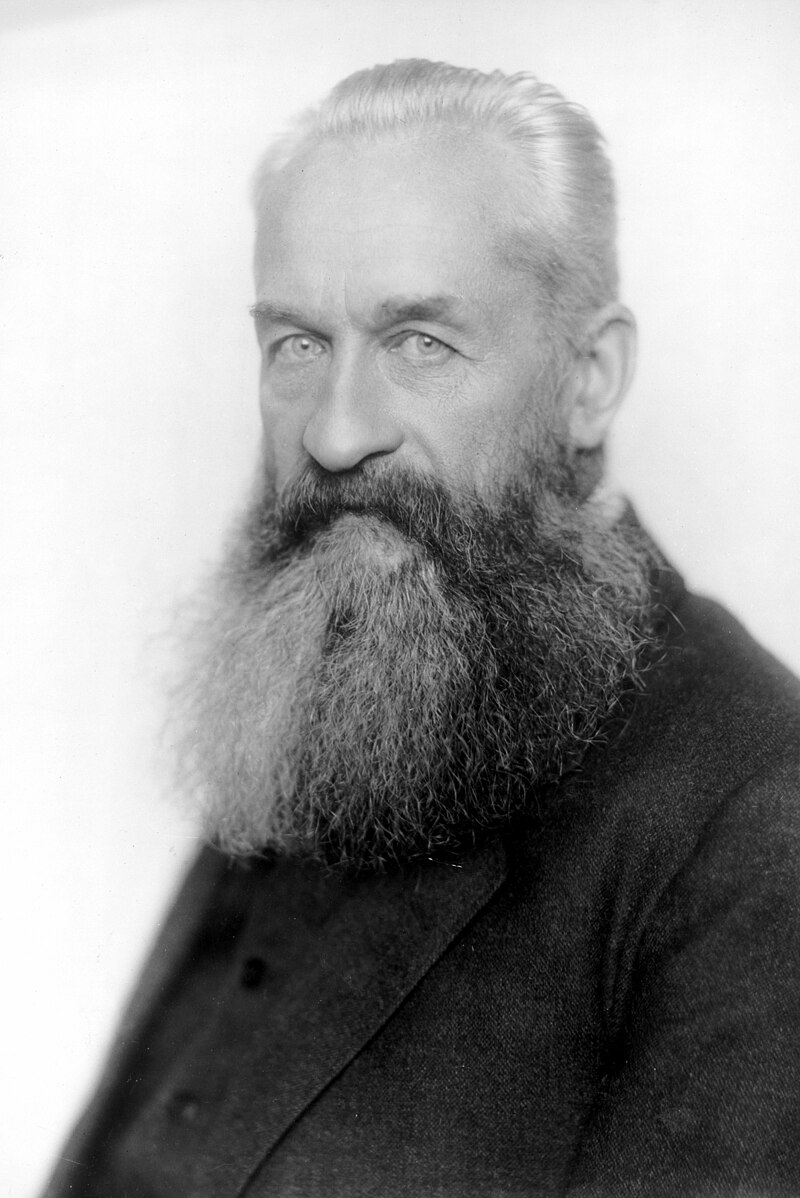
Above: Georgiv Lvov (1861 – 1925)
Michael wanted reassurance that the new government was in a position to restore order and continue the war, and that they could ensure that the promised elections for a democratic Constituent Assembly would not be blocked by the Soviet.
The answers were confidently “Yes”.
After lunch, any thought of a signed manifesto was abandoned as the lawyers were going to have to take over the process.
Six hours had passed at 12 Millionnaya Street and there was nothing more that could be done.
The delegates decided to return to Tauride Palace.
At 2:56 pm, a telegram was sent to Michael from Sirotino, a railway station 275 miles from Pskov.
Above. Present day Sirotino, Lithuania
Nicholas had suddenly remembered that he had neglected to mention to his brother that he was the new Emperor.
“To His Majesty the Emperor Michael,
Recent events have forced me to decide irrevocably to take the extreme step.
Forgive me if it grieves you and also for no warning – there was no time.
Shall always remain a faithful and devoted brother.
Now returning to HQ where hope to come back shortly to Tsarskoe Selo.
Fervently pray God to help you and our country.
Your Nicky”
As so often during the last days, Nicholas had acted when it was too late to matter.
Delegates returned to Millionnaya Street just before 3 pm, with a draft of abdication for Michael to sign.
It began with the preamble….
“We, by God´s mercy, Michael II, Emperor and Autocrat of all the Russias….”
They started off therefore on the premise that Michael was lawful Emperor, and that in abdicating he commanded the people to obey the authority of the Provisional Government in which he was vesting his powers until a Constituent Assembly determined the form of government.
This formula gave legitimacy to the new government, which otherwise was simply there by license of the Soviet.
No one had elected the Provisional Government which represented only itself, and in that regard it had arguably less authority than the Soviet which could at least claim to have been endorsed by elected soldier and worker delegates.
Michael could make the new government official and legal, as no one else could, and therefore it was important that his manifesto be issued by him as Emperor.
If he was not Emperor, he had no power to vest and no authority to command anyone.
Of political necessity the new government needed Michael to take the throne before he could give it up.
However it was not going to be that simple.
Michael was clear in his own mind about the position in which he had found himself.
He had not inherited the throne.
Alexis had been unlawfully bypassed and Michael proclaimed Emperor without his knowledge or consent.
He had not willingly become Emperor and Nicholas had no right to pass the throne to him.
At the same time, there was nothing that could be done about that.
The wrong could not be righted.
It was far too late.
The only issue therefore was how to salvage the monarchy from the wreckage that Nicholas had left in his wake.
That the government was demanding his abdication in order to appease the Soviet was a serious complication, but, even so, Michael was not going to abdicate.
Because, if he did, who was going to succeed him?
The throne was never vacant and it followed therefore that if he abdicated, someone else would immmediately become Emperor in his place.
The result was a manifesto that would make Michael Emperor without it saying that he had accepted the throne; that as Emperor he would vest all his powers in the new Provisional Government; and with that done he would wait in the wings until a future Constituent Assembly voted, as he hoped, for a constitutional monarchy and elected him.
Meanwhile, he would not reign, but neither would he abdicate.
“A heavy burden has been thrust upon me by the will of my brother, who has given over to me the Imperial Throne of Russia at a time of unprecedented warfare and popular disturbances.
Inspired like the entire people by the idea that what is most important is the welfare of the country, I have taken a firm decision to assume the Supreme Power only if such be the will of our great people, whose right it is to establish the form of government and the new basic laws of the Russian state by universal suffrage through its representatives in the Constituent Assembly.
Therefore, invoking the Blessing of God, I beseech all the citizens of Russia to obey the Provisional Government, which has come into being on the initiative of the Duma and is vested with all the plenitude of power until the Constituent Assembly, to be convoked with the least possible delay by universal suffrage, direct, equal and secret voting, shall express the will of the people by its decision on the form of government.
MICHAEL”

Above: The flag of Russia
Afterwards, Nicholas wrote in his diary:
“Misha, it appears, has abdicated.
His manifesto ends up by kowtowing to the Constituent Assembly, whose elections will take place in six months.
God knows who gave him the idea to sign such rubbish.”
Given the wreckage that he had mindlessly left behind him and the impossible position in which he had placed his brother, his effrontery has an epic quality about it.
Nicholas would never understand what he had done – that the consequence of his fatherly feelings would destroy the Romanov dynasty itself.

Above: Nicholas II (in bearskin helmet) and son Alexei
No one, including the Soviet, had expected that, nor demanded it.
Russia´s generals, fearing the future of Nicholas continuing as Commander in Chief of a war Russia was losing, asked for Nicholas´ abdication.
The Duma, fearing the power of the Soviet and the violence of the Revolution resumed, asked for Nicholas´ abdication, followed by his brother´s.
Nicholas, fearing for his son´s life, abdicated his throne and denied to his son.
Michael, fearing the end of the monarchy, chose to relinquish his power in the hopes of regaining it in a constitutional form through an elected parliament.
Through fear, a dynasty was lost, and mere months later democracy denied.
Russia still hasn´t recovered true democracy.
In America, fear rules.

Through fear, Trump came to power.
The fear of the future keeps the Republicans unwilling to act against a President unfit to rule.
The world fears what will happen if Trump continues unchecked.
“To be, or not to be; Aye, there’s the point,
To die, to sleep, is that all? Aye, all:
No, to sleep, to dream; Aye, marry, there it goes,
For in that dream of death, when we awake,
And borne before an everlasting Judge,
From whence no passenger ever returned,
The undiscovered country, at whose sight
The happy smile, and the accursed damn’d.
But for this, the joyful hope of this,
Who’d bear the scorns and flattery of the world,
Scorned by the right rich, the rich cursed of the poor?
The widow being oppressed, the orphan wrong’d,
The taste of hunger, or a tyrants reign,
And thousand more calamities besides,
To grunt and sweat under this weary life,
When that he may his full Quietus make,
With a bare bodkin, who would this endure,
But for a hope of something after death?
Which puzzles the brain, and doth confound the sense,
Which makes us rather bear those evils we have,
Than fly to others that we know not of.
Aye that, O this conscience makes cowards of us all,
Lady in thy horizons, be all my sins remembered.”
William Shakespeare, Hamlet, Act 3, Scene 1.
Above: William Shakespeare (1564 – 1616)
Chancellor Gorgon: A toast. To the undiscovered country. The future.
(Star Trek VI: The Undiscovered Country)
As Winston Churchill once said:
“The only thing we need to fear is fear itself.”
Sources: Wikipedia / Google / Star Trek VI: The Undiscovered Country / Dr. Michael Arnheim, The US Constitution for Dummies / Allan J. Lichtman, The Case for Impeachment / Helen Rappaport, Caught in the Revolution: Petrograd 1917 / Tony Brenton, Historically Inevitable?: Turning Points of the Russian Revolution
